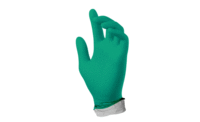SW Safety recommends reserving nitrile and latex gloves for frontline workers

As the global demand for single-use gloves increases, and personnel restrictions have decreased factory production, there will be an inevitable shortage of nitrile and latex gloves. To address this, SW® recommends that we immediately begin to reserve nitrile and latex gloves for frontline mission-critical workers and offer thermoplastic extruded (TPE) and vinyl gloves as alternatives to the general population.
The worldwide impact of the COVID-19 outbreak has placed increased demand on personal protective equipment (PPE). Many news reports have focused on N95 respiratory facemask shortages, but other PPE sectors have been impacted as well. Several factors are contributing to an eventual glove shortage that needs to be addressed.
Many PPE sectors, such as coveralls and facemasks, can increase production with relative ease, in a short period of time, as they require minor capital investments and have few regulatory requirements. In contrast, single-use gloves require significant capital investment and EPA regulatory approvals to increase production. It can take 4 to 6 months to add a new production line and a minimum $2 million investment. Factories seeking to increase their capacity also require access to more raw materials and skilled workers who may be constrained due to coronavirus restrictions.
Adding to this, demand has more than doubled at a time of low worldwide production. The beginning of the coronavirus outbreak coincided with the Chinese Lunar New Year and many factories were closed. China accounts for 10% of the global supply of single-use nitrile and latex gloves. As the Chinese government extended the Lunar New Year holiday as a result of the virus outbreak, many factories were delayed by almost two months in ramping up their production. Only now have most Chinese factories resumed full capacity production and relatively few could add additional capacity to meet this new demand at a time when they are filling months of backorders.
On March 16, Malaysia announced a Movement Control Order (MCO) to address the coronavirus pandemic. This country-wide partial lock-down stopped production for a short time, but now essential factories can operate with only 50% of their workforce if there are no COVID-19 infections. As Malaysia manufactures between 60% and 65% of global single-use nitrile and latex gloves, this will immediately place additional strains on supply. The MCO has placed also requirements on factories to ensure their employee safety through health checks and environmental sanitation. And, since packaging manufacturing is not considered essential production, these elements must be imported to fulfill orders. These new requirements have added to Malaysian operating costs and strained their ability to produce products in an economically feasible manner. This has already resulted in increased glove costs.
More recently, Thailand, which manufactures 18% of the world’s glove supply, announced a month-long state of emergency. It is too soon to fully understand the implications of how this will affect supply, but it is expected to have negative impacts.
The ripple effect of these factors, at a time of increased demand, has set a path towards a global shortage of single-use gloves. It is essential that we start to build awareness and encourage those in non-critical care environments, to help manage the available supply of single-use nitrile and latex gloves the same way they have for N95 masks. We are asking those who are not in frontline care situations to please use plastic and vinyl gloves. They are ideal for most, less demanding, personal protection situations and production can better meet demand. And, exam grade versions are also available for use in healthcare environments.
This pandemic has placed a strain on many industries and many people. At SW, we plan to focus on support of the healthcare industry and first responders to ensure their safety. We feel that, at this time, only if we work together, manage our critical resources, attend to the welfare of others, and maintain a larger global perspective, will we be able to better manage this crisis.
Belle Chou
President, SW®
Looking for a reprint of this article?
From high-res PDFs to custom plaques, order your copy today!





